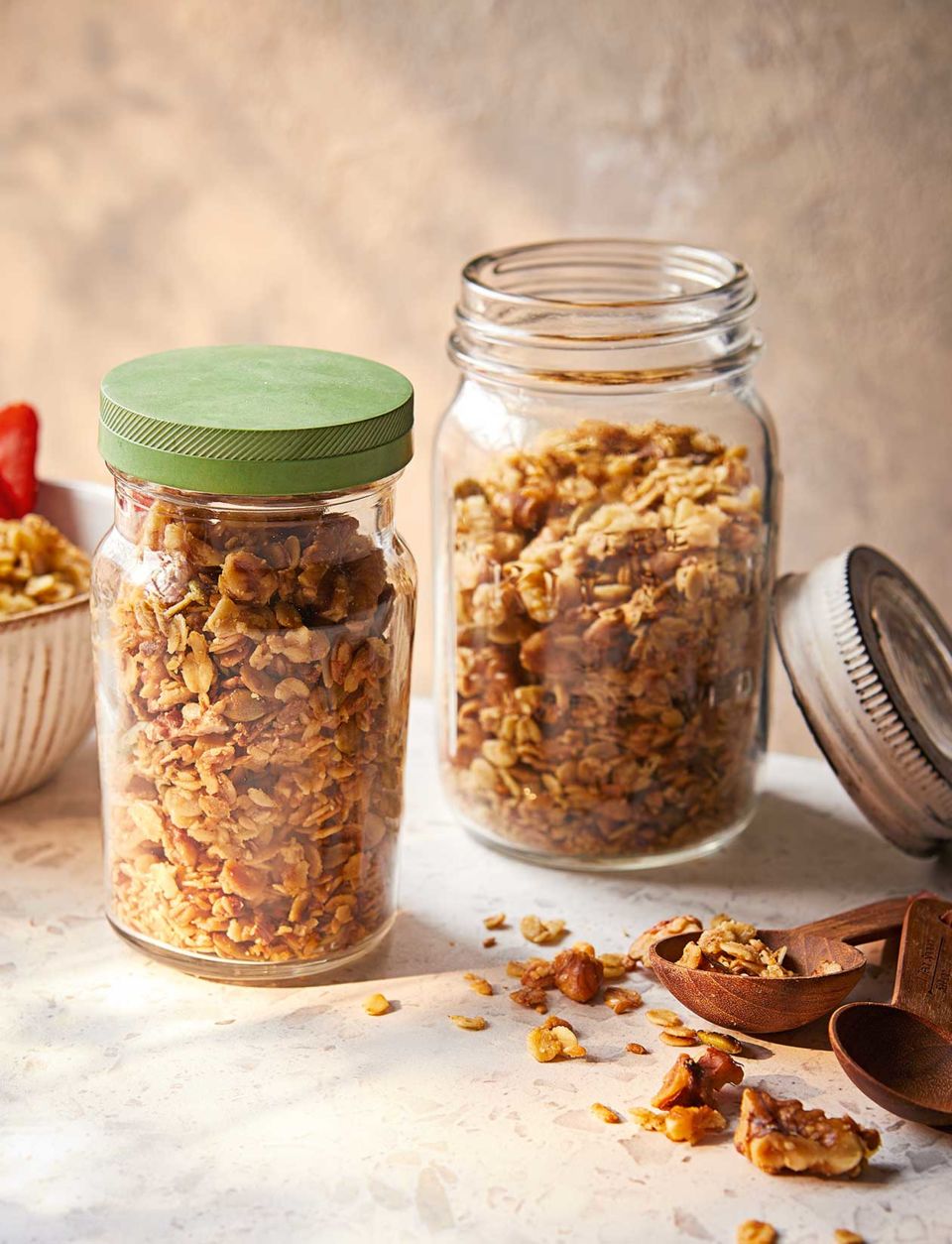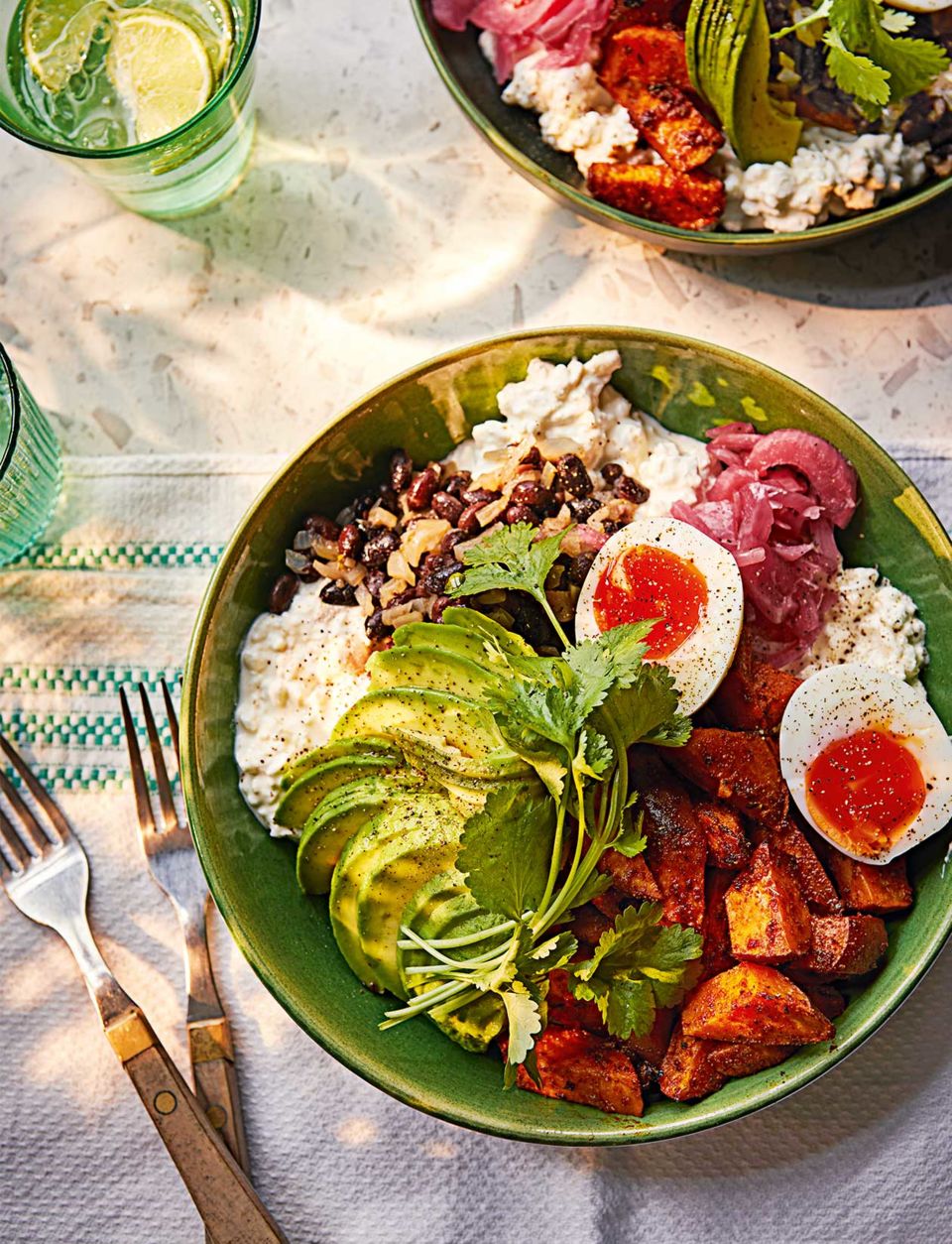Health
Your menopause pantry
by Helen Foster

Menopause happens to every woman, but with 34 confirmed symptoms, not everyone experiences it the same way – and what you eat can play a part in that. Get the lowdown on the foods that will help manage symptoms, and then try some health-boosting recipes
Menopause is defined as the cessation of periods triggered by falls in the hormones oestrogen and progesterone in the body. Ha! – if only that was all it involved. Instead, those hormonal falls bring with them often debilitating symptoms, including hot flushes and night sweats, mood swings and anxiety, and even things you might not suspect, like really itchy skin (yep, that’s your hormones!).
Best foods for menopause
While medical treatments like hormone replacement therapy (HRT) can turn things around, don’t ignore the effects of eating well when you add it to the mix. A US study published in the journal Menopause in 2020 found that women with diets high in fruits, vegetables, whole grains and nuts experienced fewer menopause symptoms than those following less Mediterranean-style diets. This doesn’t surprise Dr Lydia Robertson from the Menopause Care chain of clinics. ‘A well-balanced, nutrient-rich diet can help ease menopausal symptoms, support hormone transitions and protect against long-term health risks such as osteoporosis and heart disease that rise after menopause,’ she explains. So, what should you be eating to get these effects? Let us help you create the perfectly stocked menopause pantry…

Eat Foods That Nourish Your Gut
The gut and your hormones are linked. ‘The drop in oestrogen during menopause appears to negatively influence the gut microbiome,’ explains Dr Laura Wyness, registered nutritionist and co-author of Eating Well for Menopause (Lets Talk Food Publishing, £19.99). ‘This can worsen symptoms like bloating and constipation at menopause but, as the majority of the body’s serotonin [the “happiness hormone”] is produced by gut microbes, menopausal brain fog may also, in part, be due to this drop.’
Some gut bacteria also play a role in circulating hormones around the body, pushing these round when we need them and shuttling them for excretion when their job is done. However, as numbers fall, they don’t always perform this job effectively. Hormones that should be detoxified out of the body (known as ‘dirty hormones’) keep recirculating, ‘and this can lead to hormone imbalances that trigger symptoms like acne, migraines, brain fog, bloating and sore breasts,’ explains nutritionist Hannah Hope from Hannah Hope Nutrition in St Albans. Feeding the existing gut bacteria to keep them healthy is therefore a big part of good menopause nutrition.
‘Opt for fibre-rich foods, such as whole grains, beans, peas, lentils, vegetables and fruits,’ says Laura. ‘But also include fermented foods, such as live yogurt, kefir, kombucha and sauerkraut, to supplement the numbers of beneficial bacteria in your gut.’
Add Some ‘Trickster’ Foods
‘Food can’t replace the natural sex hormones you are losing, but it can replicate some of their effects,’ says Hannah. ‘Soy-based foods like miso and tempeh, for example, are high in substances called isoflavones that can bind to oestrogen receptors in the body, mimicking its effects.’ This may help reduce symptoms like hot flushes. Oestrogen is also an anti-inflammatory compound, and in a study published in the journal Menopause, women eating a diet high in inflammation-fighting foods experienced fewer ‘somatic’ symptoms of menopause – these include night sweats, hot flushes, brain fog and mood changes. ‘An anti-inflammatory diet is one high in oil-rich fish, fruits, vegetables and whole grains, and low in sugar and saturated fats,’ says Hannah.
Don’t Ignore the Bone Builders
Menopause significantly affects bone density, and while exercise normally gets all the glory when it comes to building bone, a 2016 study from the University of Michigan in the US suggests that a bone-friendly diet boosts its effects. Nutrient numero uno is, not surprisingly, calcium. At least 700mg a day is recommended, consumed over two to three meals or snacks, to maximise effects. ‘But it is also important to get vitamin D, which helps the body absorb the calcium, and nutrients such as potassium (from potatoes, avocados and bananas) and magnesium (seeds, nuts and green leafy veg) that also support bone health,’ says Lydia.

Work With Your Weight
On average, women gain 1.5kg a year during perimenopause. Sometimes this is related to changes in lifestyle that mean we move less, and body changes that decrease metabolism-revving muscle mass, but ‘hormone changes, particularly dwindling oestrogen, also affect how women respond to the foods they eat,’ says Ailsa Hichens, nutritionist and author of Everything They Told You About Menopause Weight Loss is Wrong! (Eglantine Press, £12.99). ‘Post menopause, you simply can’t eat the same number of carbs as you could a decade ago, and the old story of “eat less and move more” may not give the same results.’
Finding the diet that does keep your weight in check might take some trial and error, as one size does not fit all, but ‘it’s likely to mean eating to balance blood-sugar levels – so try to increase the amount of protein, veggies and healthy fats, and eat smaller amounts of oats and starchy foods like bread, rice, pasta,’ says Ailsa.
So, those are the general rules for eating to support your body during menopause – but, before you head off to the shops, there are a few more specific foods to add to your shopping list (see 8 foods to stock your menopause pantry). Get well stocked up and then put some of these to use in our health-boosting recipes.
Health-boosting recipes
We've created these health-boosting recipes that can be good to support you through menopause symptoms. Try our walnut and olive oil granola, crunchy za'atar chickpeas, tonnato toasts with roast broccoli and protein-packed cottage cheese taco bowl.













